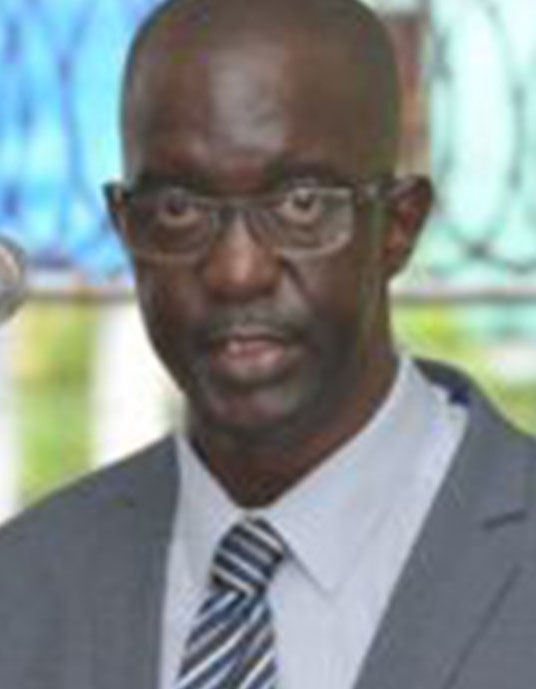Guyana is to host the headquarters of one of the region’s newest institutions, the Partnership Initiative for Sustainable Land Management (PISLM), which is to be relocated from Trinidad and Tobago.
The disclosure was made yesterday by Commissioner of the Guyana Lands and Surveys Commission, Trevor Benn, who said the host country agreement is to be signed to bring the institution here. At a press conference at the end of a two-day meeting of the Third Session of the PISLM High Level Meeting of Caribbean Ministers from Small Island Developing States at the Marriott Hotel, Benn said the move will enable Guyana to take a leading role in sustainable land management.
To this end, he said, Guyana is developing a national land use policy and is in the process of revising all national and regional land use plans to make them descriptive rather than prescriptive.
The PISLM consists of a series of commitments and action-oriented coalitions focused on deliverables, intended to translate political commitment into action. It serves as a mechanism to facilitate exchange of experiences and good land management practices between participating countries. Furthermore, the initiative serves as a mechanism for stimulating the replication of various approaches, tools and methodologies throughout the region.
At the meeting, which involved presentations from a numbers of experts, seven decisions were taken, including initiating projects on soil care and land degradation neutrality, PISLM Executive Director Calvin James disclosed.
The soil care initiative, called the Caribbean Soil Management for Restored Watersheds and Sustainable Foods Systems Project, Grenada’s Minister of Agriculture and Lands Yolande Bain-Horsford said, is an essential pillar for the sub-region in meeting its obligations under the United Nations Convention to Combat Desertification (UNCCD) and in meeting the UN Sustainable Development Goals. The project, she said, “will involve comprehensive soil surveys, and for some countries, improving soil use and management at the farm level. It will help us to prepare for the impacts of climate change, such as droughts, increased rainfall and changes we are seeing with rainfalls in our dry season.”
Grenada already has a land policy, and soil management and land degradation projects in place and has also begun a project in soil mapping and soil fertility, the minister disclosed.
Meantime, on land degradation neutrality, James said the meeting approved the Caribbean Land Degradation Neutrality Transformative Project. This will involve net neutral effect activities where, “if land is used in one area, it is restored in like manner in another area so there is a neutral impact on land use,” he related.
“This does not stop countries from developing “but it ensures there is no negative impact in countries from development,” he added.
Other decisions that came out of the meeting, James said, included the way in which the PISLM is going to work with the Caribbean Community (CARICOM), which has already given it a mandate through the Council for Trade and Economic Development. “We want to strengthen that mandate,” he asserted.
Another decision was in relation to how the PISLM will carry out its work with support from CARICOM.
Further, the meeting discussed the region’s participation in the 17th Session of the Committee for the Review of the Implementation of the Convention (CRIC 17) of the UNCCD in January 2019. James said it was felt that Guyana should not be solely responsible for hosting the activity but that other CARICOM countries should assist.
“We talked through how that will happen and a commitment was made that there will be full representation at a high level, at least ministerial, from Caribbean parties, and a process to support Guyana in terms of financing. Countries committed to rolling out that process,” James disclosed.
James is encouraging civil society to become engaged in CRIC 17. Only two civil society organisations in the Caribbean: the Caribbean Network for Integrated Rural Development and the Caribbean Youth Environmental Network, he said, have been accredited with the UNCCD.
“The ministers agreed to work with civil society to ensure there is bottom-up representation at CRIC 17,” he said.
In terms of challenges on sustainable land management, St Lucia’s Minister of Agriculture, Fisheries, Physical Planning, Natural Resources and Co-operatives, Ezechiel Joseph, said the region was faced with a lack of reliable data. There is need to share information and to collaborate, he said.
Other challenges include resources, such as financial and expertise to get things done, he said while emphasising the need to collaborate on projects instead of duplicating efforts.
Meanwhile, Jamaica’s Minister of Local Government and Community Development Desmond McKenzie, commended Guyana for leading the change for this very important aspect of the region’s preservation.
Next year and the following year hold promising prospects for the region as Guyana will host CRIC 17 in January and Jamaica will host the Vl Regional Platform on Disaster Risk Reduction in the Americas and the Caribbean, he said. It is the first time the meetings will be held in the Caribbean.





